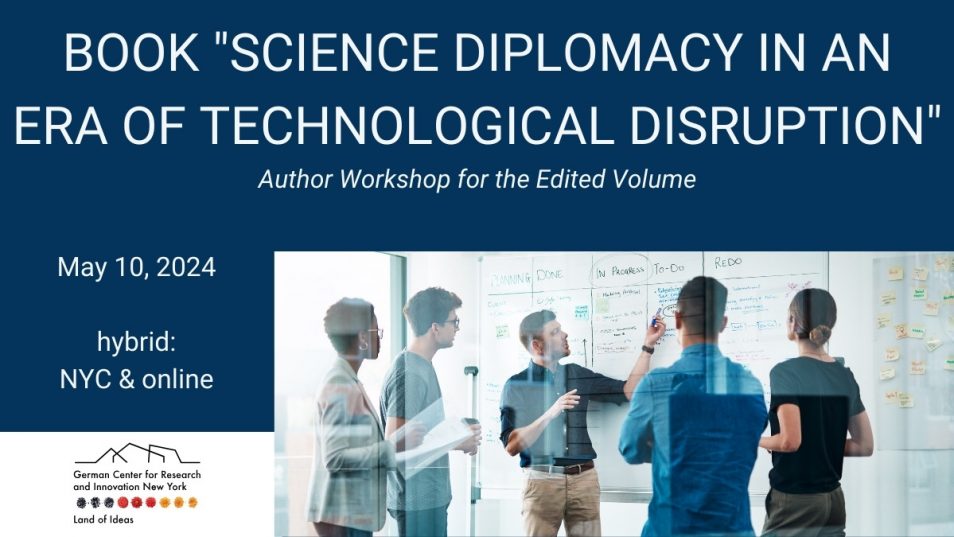Book Workshop for Edited Volume on Science Diplomacy
 © DWIH New York
© DWIH New York
The DWIH New York intends to publish, in collaboration with Martin Wählisch – who leads the United Nations Department of Political and Peacebuilding Affairs (UN DPPA) Innovation Cell in New York – an edited volume tentatively titled “Science Diplomacy in an Era of Technological Disruption.” In preparation of this project, we invited the more than 25 selected authors to join a book workshop to connect with other contributors and get inspired.
Event Information
May 10, 2024, 8:30 AM to 11:00 AM
hybrid: Cure (345 Park Ave S, New York, NY 10010) and MS Teams
Organizer(s): DWIH New York
During the DWIH FUTURE FORUM 2024 on October 31 at the Johns Hopkins Science Diplomacy Hub in Washington, D.C., the authors will present their work to the general public, more information TBA.
About the Book
In an era defined by rapid technological advancements and complex global challenges, the role of science and diplomacy has never been more crucial. Innovations surrounding the advent of Artificial Intelligence (AI), Quantum Computing (QC), biotechnology and other emerging technologies have accelerated a global race for the best minds and brains. As experienced in the recent pandemic, science is a factor that can bring nations together or pull them further apart. International and regional collaboration and competition continues to be shaped by national interests and global challenges that can even create bridges between autocratic and non-autocratic states for business opportunities in alliances of scientific convenience. International corporations of significant influence are further muddying the waters of science diplomacy, frequently exposing a dissonance between the knowledge and influence possessed by private sector entities and the requirements of policymakers for establishing standards and regulations.
This initiative will bring together leading authors from around the world to produce a first-of-its-kind edited volume on the evolving landscape of science diplomacy in the context of emerging technologies, exploring the transformative potential and the inherent challenges they pose. By bringing together leading scholars, practitioners, and policymakers from diverse disciplines, this volume intends to build an analytical framework via a comprehensive examination of how, and to what extent, science diplomacy can bridge the gap between scientific progress and international cooperation. This increasing divide has become more apparent due to disruptive technological advancements, especially in the area of AI and the growing digital divide, and destructive global political polarization that has made scientific joint ventures more complicated.
This volume will be divided into three key sections, each delving into distinct aspects of the topic. The first section will develop a conceptual framework, offering an analytical entry point and exploration of evolving definitions, scope conditions, and theoretical underpinnings of science diplomacy in the context of new technologies and their antecedent transformations. It will critically examine the role of diplomacy in shaping scientific agendas, the dynamics of international collaboration in technological research and development, and the ethical as well as normative considerations surrounding the use of new technologies in a global and international diplomatic context.
The second section offers a range of select case studies that apply the framework established in the first part of the edited volume to demonstrate practical realities and trends as well as the applications of science diplomacy in various domains. These case studies will encompass a wide range of disciplines, including but not limited to AI, QC, biotechnology, space exploration, cybersecurity, and other emerging technologies. Through detailed analysis of successful initiatives and challenges faced, this section aims to take stock of current developments with the goal to identify best practices and lessons learned that inform the intersection of science diplomacy with these new technologies and their respective domains.
The final section will act as a synthesis to explore potential consequences, future prospects and emerging trends in science diplomacy. By presenting visionary perspectives on how it can leverage new technologies to address pressing global issues, this part of the volume considers emerging fields such as quantum computing, nanotechnology, and gene editing in shaping the next era for international relations, diplomacy, and scientific cooperation. Ultimately, this edited volume seeks to foster interdisciplinary dialogue, highlighting the transformative power of science diplomacy in harnessing new technologies for the betterment of humankind. By incorporating diverse perspectives and rigorous scholarship, we aim to provide a valuable resource for scholars, practitioners, policymakers, and students interested in understanding and advancing the field of science diplomacy.
